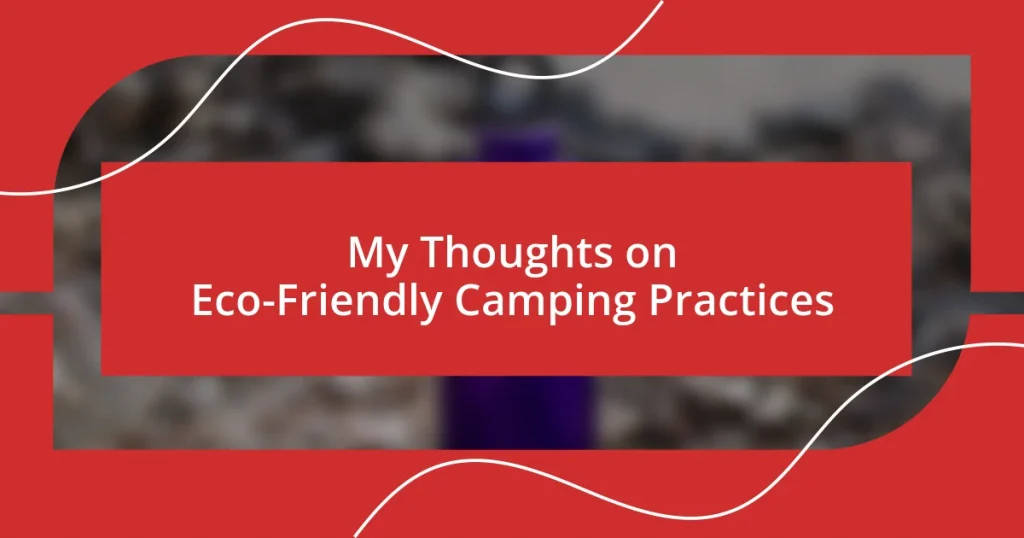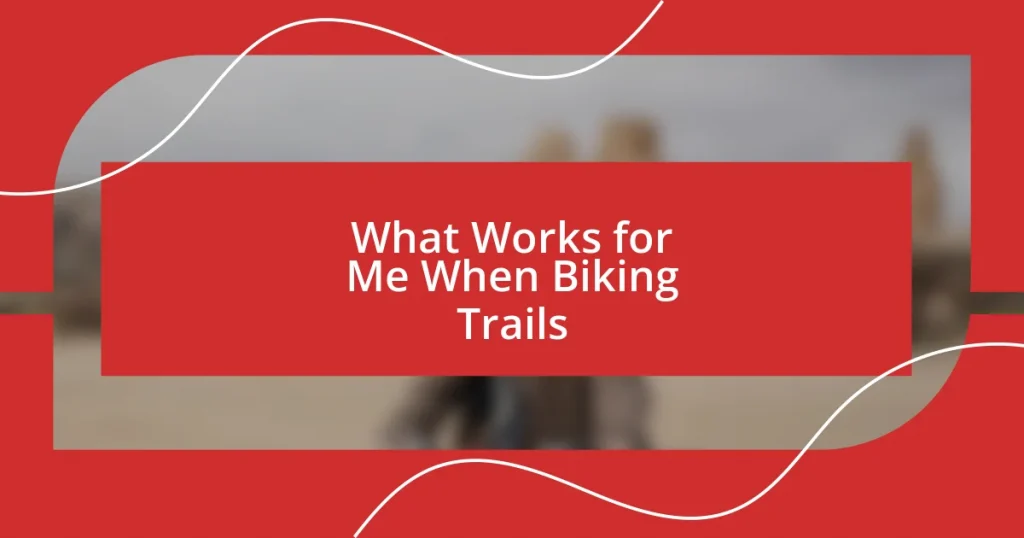Key takeaways:
- Eco-friendly camping minimizes environmental impact and enhances the overall camping experience through mindful practices such as “Leave No Trace.”
- Using sustainable gear and eco-friendly cooking methods promotes community bonding, personal satisfaction, and better health outcomes.
- Adopting habits like waste minimization and encouraging group participation in environmental care fosters a collective sense of responsibility towards nature.
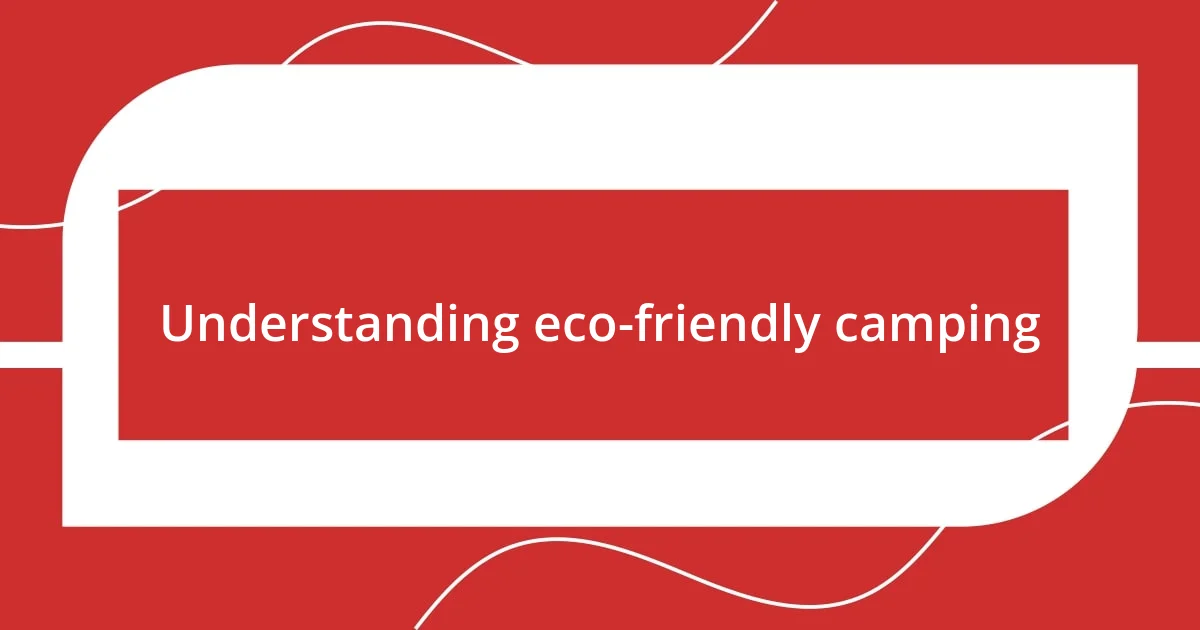
Understanding eco-friendly camping
Eco-friendly camping is all about minimizing our impact on nature while enjoying the great outdoors. I remember my first camping trip where I thoughtlessly left a snack wrapper behind. It hit me hard when I saw a curious squirrel trying to nibble on it. Wouldn’t it be better if our footprints in nature were just memories, not trash?
I’ve found that eco-friendly practices can be quite simple yet profoundly impactful. For instance, choosing biodegradable soap and using a refillable water bottle not only reduces waste but also keeps our campsites clean. Have you ever considered how small changes can create a big difference? I certainly have, especially after witnessing how a single action—like using an eco-friendly camping stove—can prevent harmful emissions.
Furthermore, understanding eco-friendly camping means embracing the principles of Leave No Trace. One of my most memorable experiences was when a fellow camper shared how they always pack out what they pack in. I felt inspired by their commitment and have since made it a personal challenge. Isn’t it rewarding to know that each responsible choice we make contributes to preserving the beauty of nature for future generations?
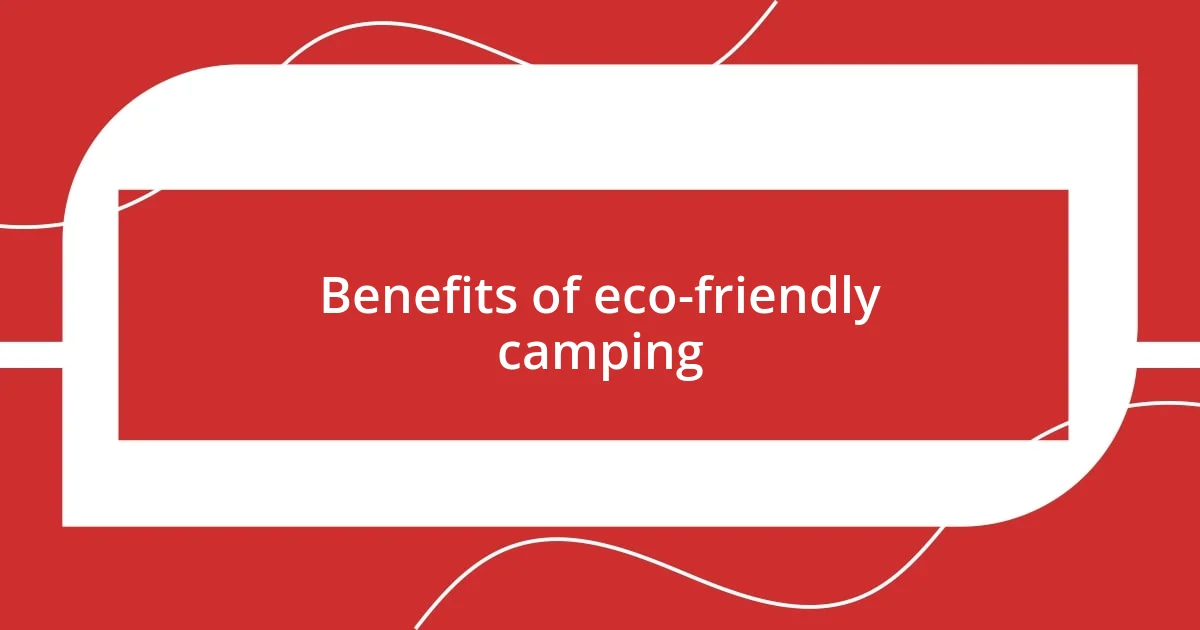
Benefits of eco-friendly camping
Eco-friendly camping offers a myriad of advantages that resonate not only with our environment but also with our own well-being. Personally, I’ve noticed that when I adopt eco-friendly practices, my camping experiences become more gratifying. It feels deeply satisfying to know that I’m leaving the site as beautiful as I found it. Last summer, I used solar-powered lanterns instead of traditional ones, which not only illuminated my campsite but also added a calming ambiance—you could almost feel the gentle energy of the sun in the air.
Another significant benefit is the sense of community that arises from eco-conscious camping. During a recent trip, I met a group of fellow campers who shared tips on sustainable practices while swapping stories around the campfire. It made me realize that eco-friendly actions often inspire camaraderie among enthusiasts. We exchanged ideas on minimizing waste and protecting wildlife, building connections that went beyond the trip itself. Isn’t it amazing how shared values can strengthen bonds?
Moreover, embracing eco-friendly camping can lead to better health outcomes. I recall a time when I chose to cook over an open flame rather than using disposable grilling equipment. Not only did it spark creativity in my meal prep, but it also connected me to nature in a profound way. Breathing in the crisp air while cooking fresh veggies was invigorating. By prioritizing sustainable practices, we not only contribute to the planet’s longevity but also enhance our physical and mental health, creating a holistic camping experience.
| Benefits | Personal Experience |
|---|---|
| Environmental Impact | Felt satisfaction from leaving no trace after a trip. |
| Community Building | Connected with fellow campers through shared eco-friendly practices. |
| Health Benefits | Improved my well-being by cooking fresh meals over an open flame. |
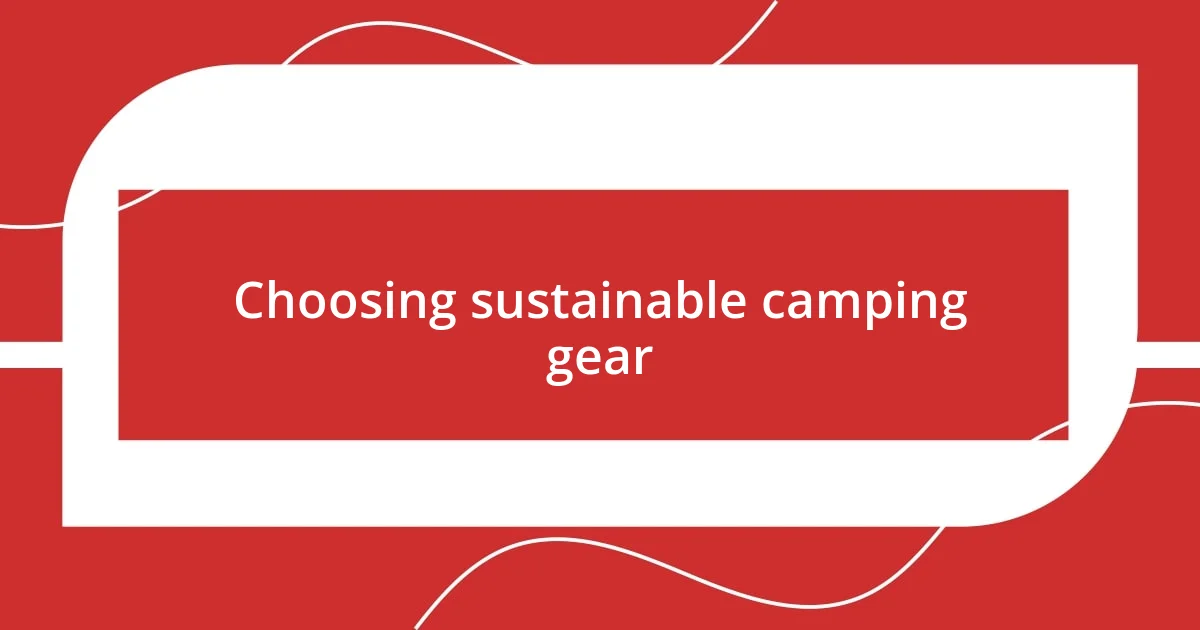
Choosing sustainable camping gear
Choosing sustainable camping gear is a critical step toward protecting our beloved outdoors. I distinctly remember the rush when I finally decided to replace my heavy, plastic cooler with a much lighter, eco-friendly option made from recycled materials. It not only eased my load but also felt like a small victory for our planet! Making thoughtful choices about gear can enhance our experience while reducing our footprint.
Here are some essentials to consider when selecting your sustainable camping gear:
- Recycled materials: Look for products made from recycled plastics or other sustainable materials.
- Durability: Invest in long-lasting items that won’t need to be replaced frequently—think stainless steel or bamboo rather than disposable items.
- Eco-friendly packaging: Opt for brands that use minimal or biodegradable packaging.
- Locally sourced products: Support local businesses that prioritize sustainable practices in their production.
- Multi-functional gear: Choose items that serve multiple purposes to reduce the quantity of gear you need.
When I upgraded to a multi-use camping stove, I realized how much space and energy I’d saved while cooking delicious meals, all without contributing to waste. Every sustainable choice creates a ripple effect, inspiring not just myself but also those around me to care for the environment more thoughtfully.
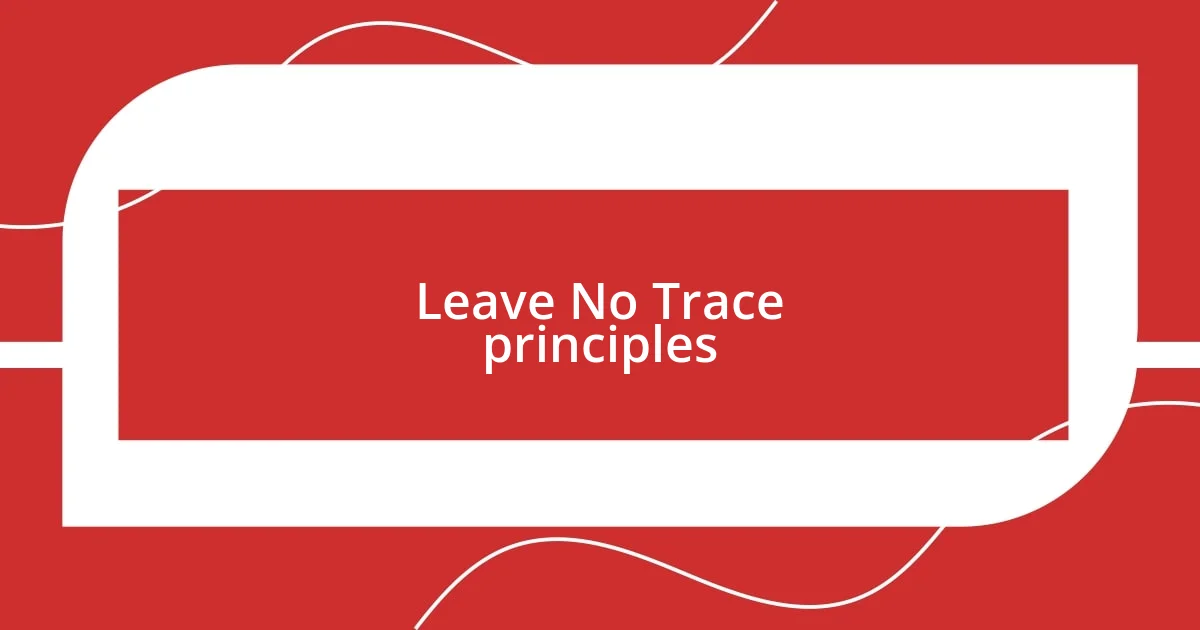
Leave No Trace principles
When we talk about Leave No Trace principles, it’s crucial to embrace the idea that every small action counts. One time, while hiking in a protected forest area, I realized how important it is to stay on marked trails. I saw a family who had wandered off the path, trampling delicate plants in their desire to get the perfect picture. It hit me hard; those little choices can have big impacts. Have you ever considered how something as simple as sticking to designated paths can help preserve nature’s beauty for future campers?
Practice makes perfect when it comes to minimizing waste and respecting wildlife. I vividly recall a trip where I took specific steps to sort my trash and compost biodegradable materials. At first, it felt like a hassle, but I soon found it was-refreshing to see the campsite spotless. I even spotted a curious raccoon rummaging through the spot where we had camped the previous year, and it made me happy to think that my choices were allowing wildlife to thrive instead of scavenging through garbage. Isn’t it gratifying to know that when we camp mindfully, we can coexist with nature rather than disrupt it?
Lastly, one of the core aspects of Leave No Trace is to be considerate of other campers. I remember an evening when I kept my voice down and turned off my lantern early, just to ensure that I didn’t disturb anyone nearby. It created a serene atmosphere that allowed me to appreciate the crackling of the campfire and the sounds of nature. Knowing that I contributed to a shared experience made the trip more enjoyable for everyone. How often do we think about how our actions affect those around us? Each of us has the power to enhance the camping experience through mindful behavior.
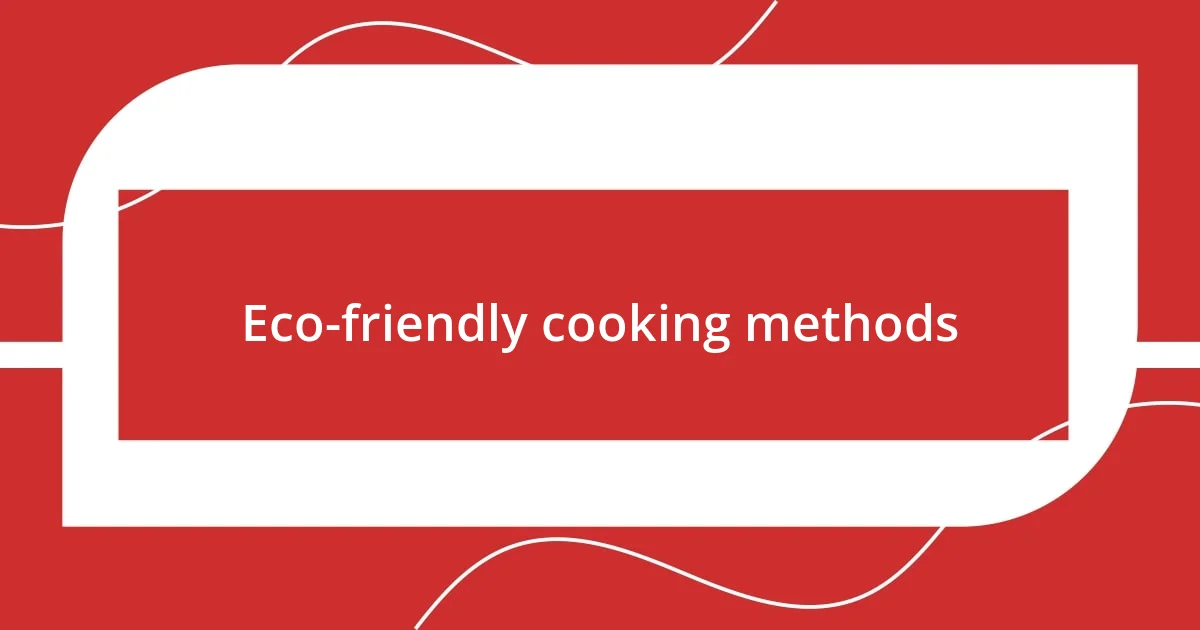
Eco-friendly cooking methods
When it comes to eco-friendly cooking methods, one of my go-to strategies is using a portable camping stove. I can’t stress enough how much cleaner and more efficient it is compared to an open campfire. On a recent trip, I whipped up a hearty vegetable stew in no time, all while minimizing smoke and avoiding the risk of a forest fire. Have you ever noticed how a controlled cooking environment makes meal prep feel less like a chore and more like an adventure?
Solar cookers are another fantastic option I’ve explored. During my last camping trip in a sunny area, I set one up to make a delightful quinoa salad. It was fascinating to watch the sun do all the work while I relaxed with a good book. It’s incredible to think that something as simple as harnessing sunlight can transform our cooking experience. Plus, it sparked curiosity among my fellow campers, who gathered around to see how it worked. How often can we claim that our cooking not only nourishes us but also educates others?
Lastly, I’ve found that planning meals ahead of time can significantly reduce waste and energy consumption. On one excursion, I prepped several meals and stored them in reusable, airtight containers. This not only saved time but also minimized the need for excessive cooking equipment. Imagine the satisfaction of enjoying a tasty meal while knowing you’ve made choices that are kinder to the planet! Isn’t it refreshing to think that we can combine convenience with eco-consciousness when preparing meals outdoors?
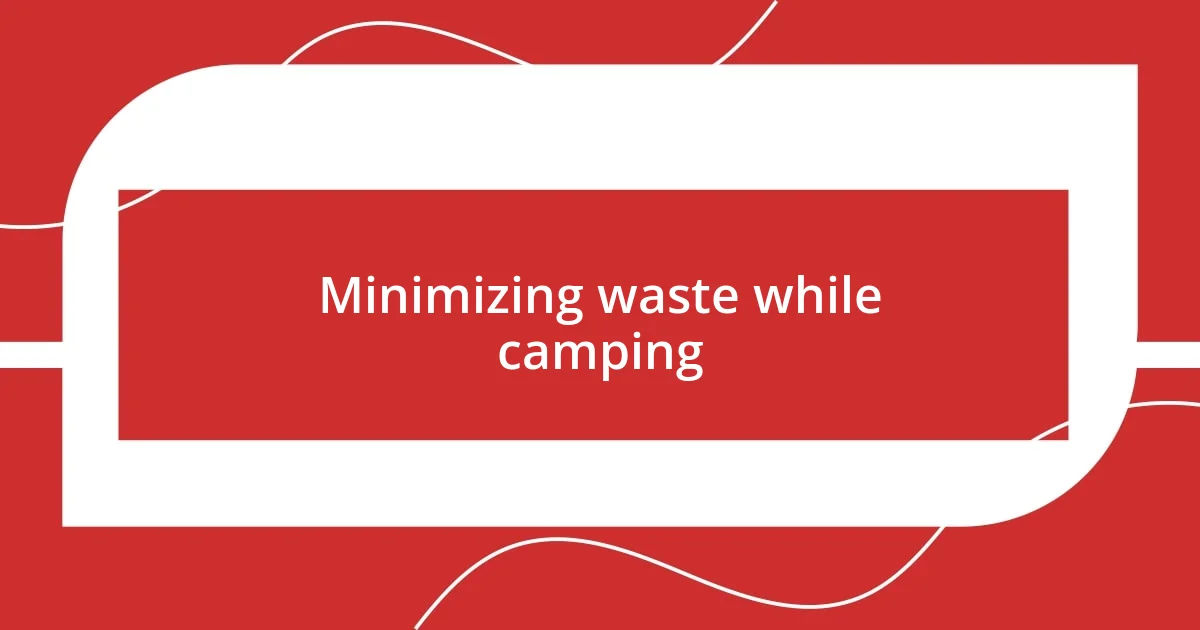
Minimizing waste while camping
Minimizing waste while camping is something I’ve grown increasingly passionate about. I remember packing for a recent trip and deliberately choosing reusable containers instead of single-use plastic bags. That decision not only made me feel good about reducing waste but also sparked conversations with fellow campers who were eager to learn about my eco-friendly methods. Have you ever felt that sense of camaraderie when sharing a common purpose with others in nature?
One habit I’ve adopted is bringing along a compact, portable trash compactor. After a day of hiking, our group would gather all garbage and crush it down to save space. It surprised me how easily it fit into my backpack and how much less waste we had to carry out at the end of our trip. Isn’t it amazing how such a small tool can foster a more sustainable camping experience while also encouraging others to join in?
Additionally, I’ve learned to embrace the concept of “pack it in, pack it out.” On one occasion, I felt a rush of pride as we collected not only our trash but also litter left by others along the trail. That moment underscored the importance of leaving a place better than we found it. I often ask myself, what legacy do I want to leave in the natural spaces I cherish? Ensuring they remain unspoiled for future adventurers is a goal worth pursuing.
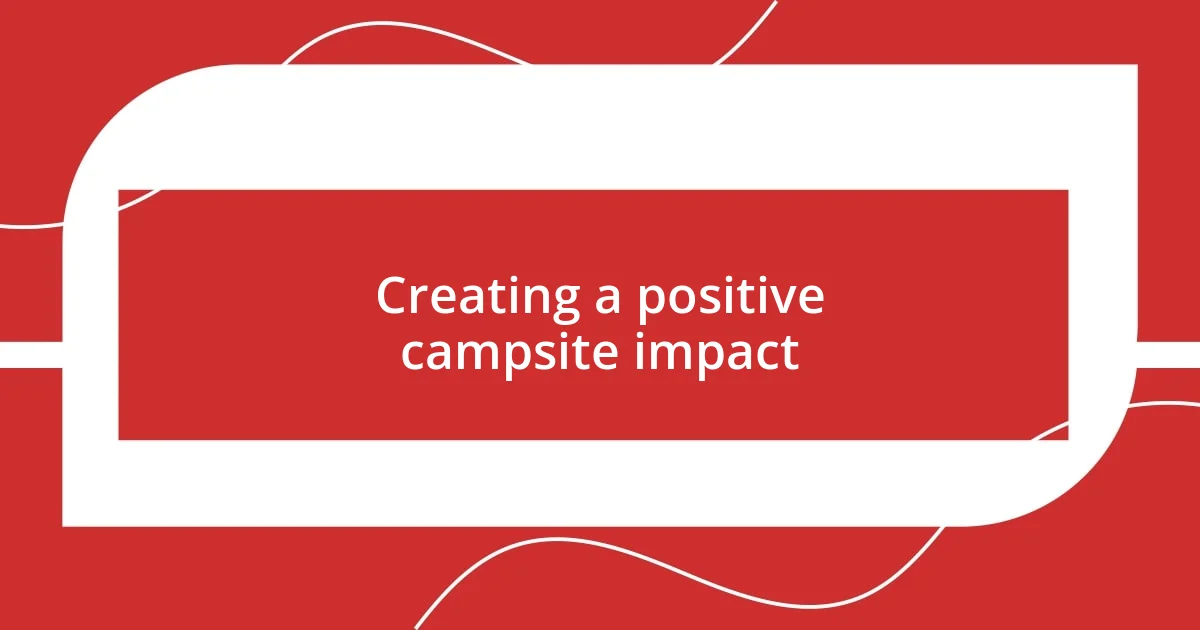
Creating a positive campsite impact
Creating a positive impact at your campsite goes beyond just minimizing waste; it’s about cultivating a sense of responsibility. I remember a particularly memorable trip where every camper in our group took it upon themselves to participate in a “cleanup challenge.” We spent an afternoon collecting trash around our campsite and the nearby trails. Not only did we leave a spotless area behind, but we also bonded over our shared mission. Have you ever felt that exhilarating rush of accomplishment when you know you’ve contributed to preserving nature?
Choosing eco-friendly materials for camping gear can also make a significant difference. When I stocked up for my last trip, I opted for biodegradable soap and compostable tableware. Seeing my friends adopt similar practices inspired me to feel like we were all in it together, striving for a more sustainable experience. It’s astonishing how small actions can ripple through a group dynamic. Isn’t it incredible how a simple change in what we choose to bring can lead to a collective ethos of care and respect for Mother Earth?
Lastly, I find that encouraging mindfulness about our surroundings elevates the camping experience. On one hike, I took the time to point out various flora and fauna, sharing their significance to the ecosystem. The awe on my friends’ faces was priceless. It reminded me that our time in nature is not just about enjoying the view but about connecting with it deeply. Why not take that extra moment to learn about the land we share? After all, fostering respect for our environment often begins with understanding its beauty and intricacies.









